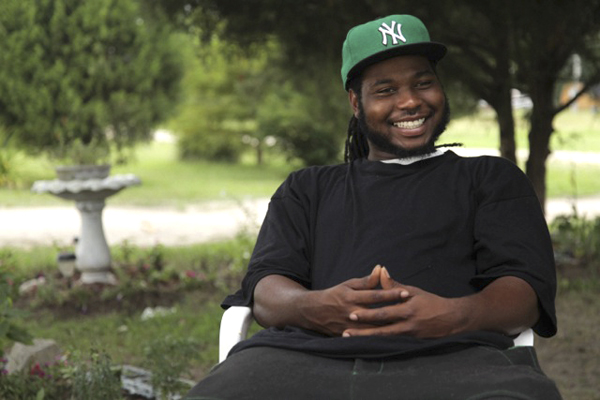During the first third or so of Raising Bertie, it seems as if the film is going to explore a nontraditional education model and its possibilities of success. We are introduced to a trio of at-risk African American teens in rural Bertie County, North Carolina, whose last and best chance to graduate high school is attending an alternative program called the Hive, which is less institutional and more familial than a typical public school. Then suddenly, the state cuts the Hive’s funding, and for a time, both the youth and film scramble to collect their bearings.
From then on, the narrative has a loose structure, though it continues to follow the same three students, who now must go back to attending public school. Each has potential that may or may not get unlocked. Reginald, aka Junior, is seemingly disinterested in his classes, but is handy with tools and likes to fix up cars. But he lacks drive, and even when adults remind him repeatedly that he must create his own opportunities, he seems unconvinced. Meanwhile, the soft-spoken Davonte, aka “Dada,” wants to attend barber college. However, he struggles with shyness and is slower to learn than his peers.
David, nicknamed Bud, puts on a tough front and has trouble keeping his emotions in check, which has led to disciplinary problems. We empathize with all three early on, after catching a glimpse of their domestic lives. Each comes from a struggling, broken home, in which the common denominator is an overworked mother and an absent father. Junior’s father, for example, is in prison for killing his girlfriend and shooting a police deputy. Dada’s, by contrast, recently separated from his mother, and his involvement in his son’s life sometimes takes a backseat.
But life goes on, the boys endure growing pains at school, and over the span of several years, start down different paths. Dada, for example, takes up football to keep himself out of trouble. Other choices give us pause, such as Junior taking up with a bad crowd. A common theme is the search for the strong male figure who’s been missing. In Junior’s case, he looks up to the oldest of the local boys, who is nevertheless trouble, while Dada signs up for football partially to reconnect with his dad. As for Bud, he claims not to have any role model, which hinders him when he must step up and be a man and he doesn’t seem to know how.
Director Margaret Byrne filming in a vérité style, draws as little attention as possible to herself and lets the boys dictate where the story goes. She features them a lot through voice-overs, by which we get their innermost thoughts, which can be especially revelatory when it’s from the more taciturn subjects. The aesthetic also leads to moments that feel voyeuristic, such as when one of the young men receives an expletive-laden haranguing from his mother, or downright harrowing when a brawl messily erupts in front of someone’s home. In addition, there are tender moments that unfold in a manner that seems genuinely spontaneous. One of the best scenes is at a school dance, when Dada’s girlfriend coaxes him out onto the dance floor.
Along with crafting a multifaceted character study, Byrne captures the sadness of her setting, especially for her subjects. There may be plenty of dirt roads for them to run down, but few resources to occupy their minds in productive ways. At home, they spend too many waking hours sprawled out in front of the television. Even when Bud ventures out to a house party at one point, it doesn’t feel the least bit lively, no matter how many people abound. As for the grown-ups, they have their churches, but they only seem like a brief respites from the monotonous factory work.
Yet there are also genuinely stirring moments that come from watching the film’s subjects grow up. Raising Bertie is unpredictable for the most part, beginning with the closure of the Hive, a real-life twist Byrne likely did not see coming. She made a gutsy decision to continue, and in doing so, she ends up with a rich portrait of three black males coming of age, here where the odds are stacked against them.







Leave A Comment